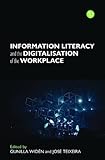Information literacy and the digitalization of the workplace / edited by Gunilla Widén and José Teixeira.
Material type: Computer fileLondon : Facet Publishing, 2023Description: 1 online resource (xxvii, 157 pages) : digital, PDF file(s)Content type:
Computer fileLondon : Facet Publishing, 2023Description: 1 online resource (xxvii, 157 pages) : digital, PDF file(s)Content type: - text
- computer
- online resource
- 9781783305803 (ebook)
- 28.7071
- ZA3075 .I546 2023
| Item type | Current library | Call number | URL | Status | Barcode | |
|---|---|---|---|---|---|---|
 E-Book
E-Book
|
Ranganathan Library | 28.7071 (Browse shelf(Opens below)) | Link to resource | Available | E01947 |
Title from publisher's bibliographic system (viewed on 15 Dec 2023).
1 Advancing Theory on Workplace Information Literacy; Farhan Ahmad and Gunilla Widén ; ; 2 Literature Review: In Search of the Many Meanings of Information Literacy; José Teixeira and Muhaimin Karim ; ; 3 Digital Literacy in a Post-Digital Era: Rethinking 'Literacy' as Sociomaterial Practice; Mika Mård and Anette Hallin ; ; 4 Methodological Choices of Information Literacy at the Workplace: Qualitative, Quantitative or Mixed Methods?; Shahrokh Nikou and Farhan Ahmad ; ; 5 Investigating Information Seeking and Information Sharing Using Digital Trace Data; José Teixeira ; ; 6 Making Do with Limited Transparency of Sensitive Information in Secretive Organizations: Collective Information Literacy Through Hinting; Inti José Lammi and Anette Hallin ; ; 7 Information Literacy Competencies for Career Transitions in the Digital Age Marina Milosheva, Hazel Hall, Peter Robertson and Peter Cruickshank ; ; 8 The Importance of Information Literacy for Work Satisfaction in a World-Wide-Workplace Context Angela Djupsjöbacka, Jannica Heinström and Eva Österbacka ; ; 9 Entrepreneurs' Digital Information Sources Selection: A Perspective to Impact of Information Literacy and Generational Differences; Thao Orrensalo, Malin Brännback and Shahrokh Nikou ; 10 Conclusion: Workplace information literacy as the literacy of digital workplace; Isto Huvila, Gunilla Widén and José Teixeira
Digitalisation has had an overwhelming impact on the workplace in recent years, making it more associable, editable, interactive, programmable, traceable, communicable and distributable. But this change comes with substantial changes to ways of working. New technologies almost always translate into new work processes, work arrangements, collaborative engagements and thus disrupt the information environment and consolidate equilibria at work.<br><br>This book aims to bring forward the role of workplace information literacy as a key condition for successful digitalisation or digital transformation in today's workplace. Featuring contributions from leading scholars, it examines the multifaceted role of workplace information literacy in organisational operations and its role in the digitalisation process, taking into account the role and perspectives of employer and employee. The book includes lessons learned from investigating workplace information literacy across very different empirical domains (e.g., a nuclear power plant, an open-source software community, and a university among others). It outlines methodological and conceptual developments for anyone investigating information literacy across the modern workplace undergoing digitalisation, extending the debate on the impact of digitalisation on individuals and organisations. The book will guide researchers interested in the digital workplace by aggregating conceptual, methodological and processual knowledge on the impacts of digitalisation on the contemporary workplace from an information-centered perspective.
There are no comments on this title.
